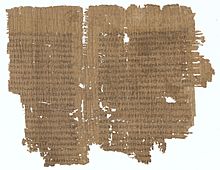Papyrus 8
Papyrus 8
| texte | Actes des Apôtres 4-6 † |
|---|---|
| langue | Grec ancien |
| date | IVe siècle |
| trouvé | Égypte |
| maintenant à | Musées nationaux de Berlin |
| dimension | 18.6 x 10.4 |
| type | Texte alexandrin |
| Catégorie | II |
Le Papyrus 8 (8) ou α 8 (von Soden), est une copie du Nouveau Testament en grec, réalisée sur un rouleau de papyrus au IVe siècle[1].
Le texte est un fragment des Actes des Apôtres (4,31-37; 5,2-9; 6,1-6.8-15)[1]. Il est écrit en deux colonnes, de 25 lignes par colonne[2]. Les dimensions du manuscrit sont 18.6 x 10.4 cm[3].
Le texte est de type alexandrin. Kurt Aland le classe en Catégorie II[1].
Il fut découvert par Constantin Tischendorf. Le manuscrit a été examiné par A. H. Salonius.
Il est actuellement conservé aux Musées nationaux de Berlin (Inv. no. 8683) de Berlin[1],[3].
Voir aussi[modifier | modifier le code]
Références[modifier | modifier le code]
- Kurt Aland, and Barbara Aland, The Text of the New Testament: An Introduction to the Critical Editions and to the Theory and Practice of Modern Textual Criticism, trad. Erroll F. Rhodes, William B. Eerdmans Publishing Company, Grand Rapids, Michigan, 1995, p. 96.
- C. R. Gregory, Die griechischen Handschriften des Neuen Testament, p. 46.
- « Liste Handschriften », sur Münster Institute, Institute for New Testament Textual Research (consulté le )
Bibliographie[modifier | modifier le code]
- C. R. Gregory, Textkritik des Neuen Testaments III (Leipzig: 1909), pp. 1087-1090.
- C. R. Gregory, Die griechischen Handschriften des Neuen Testament, p. 46.
- A. H. Salonius, Die griechischen Handschriftenfragmente des Neuen Testaments in den Staatlichen Museen zu Berlin, ZNW 26 (1927), pp. 97-119.


